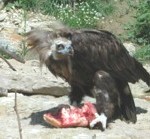 Once hunted, poisoned and misunderstood, the birds and their fate were discussed by ornithologists at Salonica meeting last month Aegypius monachus, the black vulture, survives in the Dadia Forest.
Once hunted, poisoned and misunderstood, the birds and their fate were discussed by ornithologists at Salonica meeting last month Aegypius monachus, the black vulture, survives in the Dadia Forest. THANASSIS TSINGANAS
THESSALONIKI - Half a century ago, many people in Europe misunderstood vultures. People hunted them or fed them bait laced with strychnine. Soon, the birds started to disappear.
Now many countries where vultures have vanished are mounting campaigns to bring the birds back. With the help of ornithologists, environmental organizations and other experts, they are reintroducing lost species and creating suitable breeding conditions for them.
France, Italy and other countries near the Alps have begun reintroducing vultures to their landscapes. Spain boasts many species of vultures. And Greece is the only Balkan country which still has a breeding colony of black vultures (in the Dadia Forest in the northern prefecture of Evros), as well as significant breeding sites for Eurasian griffon, Egyptian and bearded vultures. The last remaining six breeding pairs of bearded vultures are in Crete.
“Most people in Europe now understand the importance of maintaining and protecting these species, which, apart from being symbols of wildlife and nature and their usefulness in cleaning up the countryside, can also attract visitors to areas which have developed ecotourism,” said Alvaro Camino, the Spanish head of the European Union working party on Eurasian griffon vultures, at a conference in Thessaloniki last month on protecting and managing vulture populations.
The conference, jointly organized by WWF-Hellas and the Natural History Museum of the University of Crete, attracted participants from Europe, the Balkans, Turkey, Ukraine and Israel and from NGOs.
While illegal hunting and poisoned bait remain the greatest threats to vultures, another problem arises from the strict measures taken by the EU to combat bovine spongiform encephalopathy (popularly known as “mad cow disease”), which prevent environmentalists from supplementing the birds’ diet with food from livestock farms.
Comparing data, Dora Skartsi of WWF-Hellas and Michalis Probonas of Crete’s natural history museum reported to the conference that all four vulture species found in Europe are represented in Greece and that all four are listed as being under threat of extinction.
In Greece those most at risk are the bearded vulture (27 birds), and the black vulture, which can only be found in Evros (90-100 birds). There are some 150 pairs of Eurasian griffon vultures and 100 pairs of Egyptian vultures.
http://www.ekathimerini.com/4dcgi/news/ell__KathiLev&xml/&aspKath/ell.asp?fdate=03/12/2005



